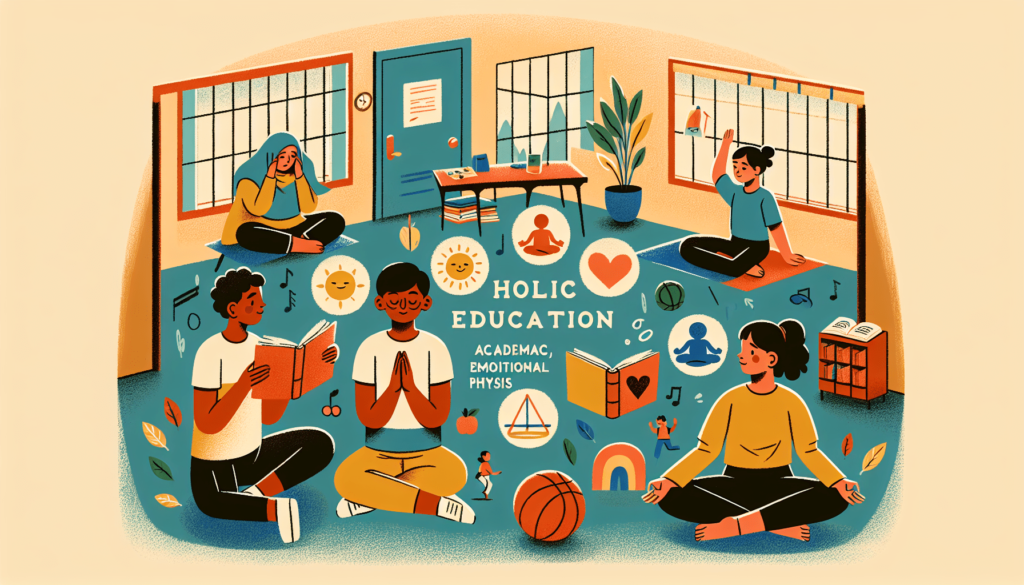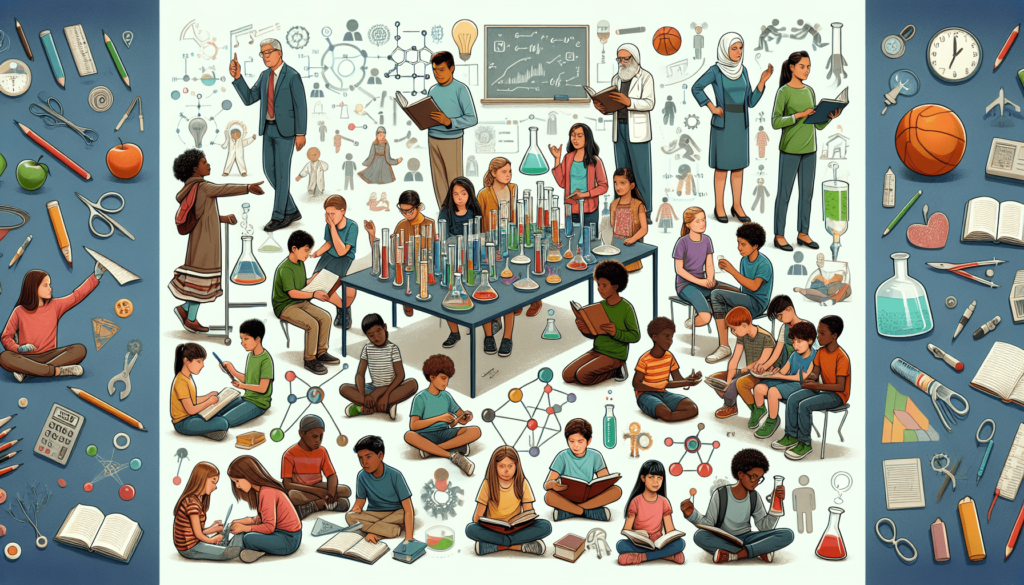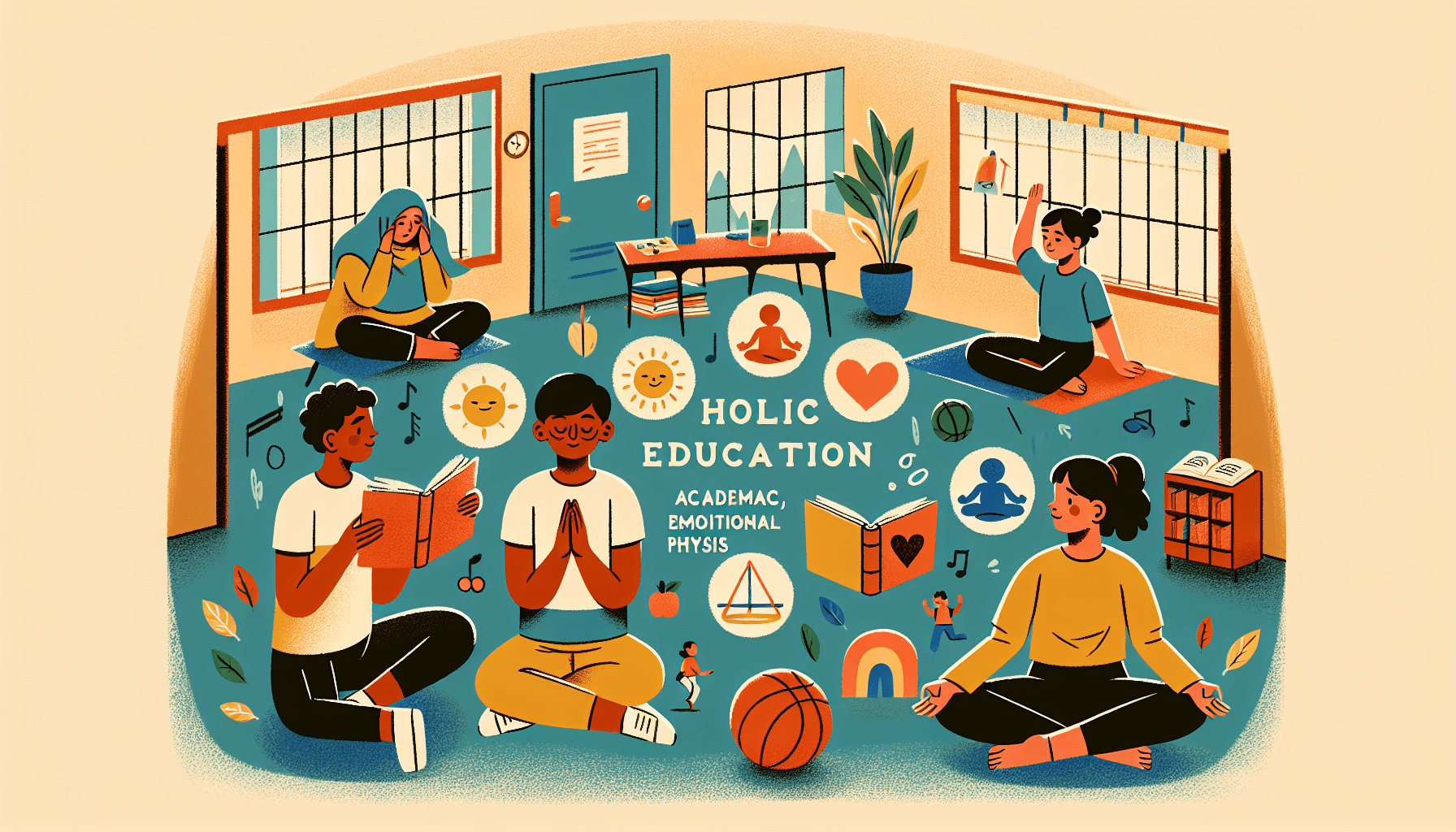In today’s fast-paced world, education is often seen as a means to achieve academic success, with little emphasis on overall personal growth and development. However, there is a growing recognition of the importance of a holistic approach to education, one that goes beyond academics and aims to foster the well-rounded development of individuals. Holistic education focuses not only on intellectual stimulation but also on emotional, social, and physical well-being. It recognizes that true learning goes beyond textbooks and exams, and instead encourages students to explore their passions, develop critical thinking skills, and cultivate values such as empathy and resilience. Join us as we explore the benefits of holistic education and how it prepares students to thrive in an ever-changing world.
Importance of Holistic Education
Holistic education is a comprehensive approach to learning that recognizes the importance of developing well-rounded individuals. It goes beyond academics and focuses on enhancing personal growth and self-awareness while promoting critical thinking skills. By providing a more holistic approach to education, students are encouraged to explore different aspects of themselves and the world around them, leading to a more fulfilling and meaningful education experience.
Components of Holistic Education
Holistic education encompasses various components that contribute to the overall development of students. These components include:
Academic learning
Academic learning forms the foundation of holistic education. It includes traditional subjects such as math, science, language arts, and social studies. By providing students with a strong academic foundation, holistic education prepares them for future success while fostering a love for lifelong learning.
Physical education
Physical education plays a vital role in holistic education as it promotes physical fitness, coordination, and overall well-being. It helps students develop healthy habits and instills a sense of discipline, teamwork, and sportsmanship.
Emotional intelligence development
Emotional intelligence is the ability to recognize, understand, and manage one’s emotions effectively. Holistic education places a strong emphasis on emotional intelligence development, helping students develop self-awareness, empathy, and interpersonal skills.
Social and interpersonal skills
The development of social and interpersonal skills is a crucial component of holistic education. By fostering collaboration, communication, and conflict resolution skills, students are better prepared to navigate relationships and interact effectively with others.
Creativity and artistic expression
Holistic education encourages creativity and artistic expression as essential tools for self-expression and exploration. It provides opportunities for students to engage in various art forms, such as music, dance, drama, and visual arts, allowing them to express themselves freely and tap into their innate creativity.
Environmental education
Environmental education promotes a sense of environmental responsibility and sustainability. By educating students about the importance of protecting the environment, holistic education instills a deep appreciation for nature and equips students with the knowledge and skills needed to address environmental challenges.

Benefits of Holistic Education
Holistic education offers a wide range of benefits for students, including:
Improved academic performance
Contrary to popular belief, holistic education does not neglect academic performance. In fact, by addressing the whole child, holistic education enhances academic performance by fostering a love for learning, promoting critical thinking skills, and providing a well-rounded education experience.
Enhanced problem-solving abilities
Holistic education emphasizes the development of critical thinking and problem-solving skills. By encouraging students to explore different perspectives, think critically, and find innovative solutions to challenges, holistic education prepares them for success in a rapidly changing world.
Promotion of overall well-being
Holistic education recognizes the importance of supporting students’ overall well-being. By addressing their physical, emotional, and social needs, holistic education creates a nurturing environment where students can thrive and reach their full potential.
Development of lifelong learners
Holistic education instills a love for lifelong learning in students. By promoting curiosity, creativity, and a thirst for knowledge, holistic education equips students with the skills and mindset needed to become lifelong learners who continuously seek growth and self-improvement.
Holistic Education Approaches
There are various approaches to holistic education, each with its unique focus and philosophy. Some of the most well-known holistic education approaches include:
Montessori education
Montessori education follows the principles developed by Dr. Maria Montessori. It emphasizes hands-on learning, individualized instruction, and self-directed learning. Montessori schools provide a prepared environment where students can explore and learn at their own pace, fostering independence and a love for learning.
Waldorf education
Waldorf education, developed by Rudolf Steiner, places a strong emphasis on creating a balanced education that addresses the intellectual, emotional, and physical aspects of a child’s development. Waldorf schools focus on creativity, imagination, and practical skills, fostering a harmonious integration of body, mind, and spirit.
Reggio Emilia approach
The Reggio Emilia approach, originating from Reggio Emilia, Italy, believes in the importance of child-led learning and the inherent creativity and curiosity of every child. This approach encourages exploration, collaboration, and self-expression, and values the role of the environment in a child’s learning and development.
Experiential learning
Experiential learning is a hands-on approach that emphasizes learning through direct experience. Through real-life experiences, such as field trips, hands-on projects, and practical applications of knowledge, students gain a deeper understanding of concepts and develop essential skills.
Project-based learning
Project-based learning involves engaging students in long-term, in-depth projects that require critical thinking, collaboration, and problem-solving skills. By working on meaningful projects, students apply their knowledge in real-world contexts, fostering deeper understanding and a sense of ownership over their learning.

Role of Teachers in Holistic Education
Teachers play a crucial role in holistic education by:
Facilitating individualized learning
In holistic education, teachers adapt their teaching methods to meet the individual needs and interests of each student. They provide personalized instruction, offer guidance, and create opportunities for students to explore their areas of interest, fostering a sense of agency and self-directed learning.
Encouraging holistic development
Teachers in holistic education foster the holistic development of students by addressing their physical, emotional, social, and intellectual needs. They create a safe and nurturing environment where students feel supported and encouraged to grow in all areas of their lives.
Creating a nurturing environment
Teachers in holistic education create a nurturing and inclusive environment where students feel respected, valued, and included. They cultivate positive relationships with their students, promoting a sense of belonging and emotional well-being.
Promoting self-reflection
Teachers in holistic education encourage students to reflect on their learning experiences and personal growth. They provide opportunities for self-assessment, reflection, and goal-setting, helping students develop self-awareness, self-regulation, and a growth mindset.
Incorporating Holistic Education in Schools
To incorporate holistic education in schools, various strategies can be implemented, such as:
Curriculum design and integration
Holistic education involves designing a curriculum that encompasses all the components of holistic education. Integrating various subjects and approaches promotes a well-rounded education experience, ensuring the development of the whole child.
Emphasizing experiential learning
Experiential learning is an effective way to incorporate holistic education in schools. By providing opportunities for hands-on, real-life experiences, schools can engage students in meaningful learning that connects to their interests and promotes deep understanding.
Providing varied assessment methods
Assessment methods in holistic education should go beyond traditional exams and grades. Schools can incorporate alternative assessment methods, such as portfolios, exhibitions, and presentations, which allow students to showcase their learning and growth in diverse ways.
Creating supportive learning environments
Creating supportive learning environments is vital in holistic education. Schools should foster a sense of community, encourage collaboration, and provide resources and support systems that address students’ physical, emotional, and social needs.
Holistic Education and Career Readiness
Holistic education not only prepares students academically but also equips them with essential skills for career readiness. Some ways in which holistic education promotes career readiness include:
Equipping students with interpersonal skills
Holistic education emphasizes the development of interpersonal skills, such as communication, collaboration, and empathy. These skills are essential for success in the workplace, as they enable students to build positive relationships, work effectively in teams, and adapt to diverse work environments.
Enhancing adaptability and resilience
Holistic education encourages students to navigate challenges, think creatively, and adapt to different situations. By fostering adaptability and resilience, holistic education prepares students to thrive in a rapidly changing job market and navigate the uncertainties of the future.
Promoting creativity and innovative thinking
Holistic education fosters creativity and innovative thinking, which are highly sought-after skills in the professional world. By encouraging students to think outside the box and take risks, holistic education prepares them to be creative problem solvers and innovative thinkers in their future careers.
Parental Involvement in Holistic Education
Parental involvement is crucial in supporting holistic education. By actively participating in their child’s education, parents can contribute to their holistic development. Some ways in which parents can be involved in holistic education include:
Establishing a home environment conducive to holistic learning
Parents can create a home environment that supports holistic learning by providing a quiet space for studying, encouraging reading and exploration, and fostering a love for learning through conversations and discussions.
Supporting diverse interests and passions
Parents can support their child’s diverse interests and passions by providing resources, encouraging extracurricular activities, and facilitating opportunities for exploration and growth in areas of interest.
Encouraging self-reflection and personal growth
Parents can play a role in their child’s self-reflection and personal growth by encouraging open conversations, asking reflective questions, and providing emotional support. By fostering self-awareness and personal growth, parents contribute to their child’s holistic development.
Challenges of Implementing Holistic Education
Implementing holistic education in schools can come with certain challenges, including:
Balancing academic demands with holistic development
Finding a balance between academic demands and holistic development can be challenging. Schools must ensure that the academic curriculum does not overshadow other components of holistic education and that students have ample time and resources for personal growth and exploration.
Ensuring comprehensive teacher training
Implementing holistic education requires comprehensive teacher training that goes beyond traditional teaching methods. Teachers need to be equipped with the knowledge, skills, and mindset to implement holistic approaches, understand individual student needs, and create inclusive and nurturing learning environments.
Overcoming resistance to change and traditional education paradigms
Implementing holistic education may face resistance from stakeholders who are accustomed to traditional education paradigms. Convincing them of the benefits and effectiveness of holistic education may require a shift in mindset and a willingness to embrace new approaches to learning.
Successful Examples of Holistic Education
There are several successful examples of holistic education around the world, including:
Green School in Bali, Indonesia
Green School in Bali, Indonesia, is known for its holistic approach to education that incorporates sustainability, outdoor learning, and a focus on environmental stewardship. Students at Green School engage in hands-on activities, sustainable practices, and experiential learning, fostering a deep connection with nature and a sense of global citizenship.
Brooklyn Free School in New York, USA
Brooklyn Free School is a democratic school in New York City that values student autonomy, freedom of choice, and community involvement. The school follows a personalized approach to learning, allowing students to pursue their interests and passions, promote holistic development, and take responsibility for their own education.
Auroville, an experimental township in India
Auroville, an experimental township in India, is home to several holistic education initiatives. These initiatives emphasize the holistic development of individuals through experiential learning, artistic expression, and a focus on sustainability and community engagement. Auroville’s holistic education initiatives are known for fostering self-directed learning and a spirit of exploration.
In conclusion, holistic education plays a vital role in the development of well-rounded individuals. By encompassing various components such as academic learning, physical education, emotional intelligence development, and creativity, holistic education promotes critical thinking skills and personal growth. It benefits students by improving academic performance, enhancing problem-solving abilities, promoting overall well-being, and developing lifelong learners. Various approaches, such as Montessori and Waldorf education, along with the role of teachers and parental involvement, contribute to the successful implementation of holistic education. Despite challenges, successful examples of holistic education, like the Green School in Bali and Brooklyn Free School in New York, demonstrate the effectiveness of holistic approaches in providing a comprehensive and meaningful education experience.

